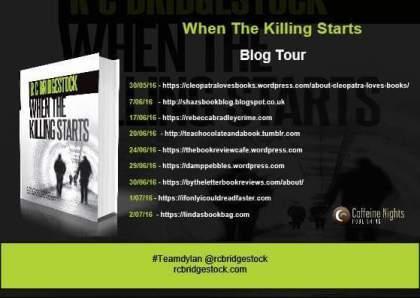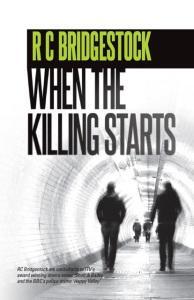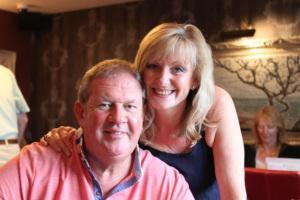
When I was contacted by Carol to ask if I would be interested in taking part in the blog tour for their seventh book in the Jack Dylan series I said yes, of course – why? Well to be honest although I had read the first book; Deadly Focus I hadn’t kept up to date – the reason for my interest was the fact they’d been consultants on one of the few TV programmes I watch – Happy Valley and I was keen to know more and fortunately as well as providing some background to how Jack Dylan came about Bob and Carol kindly included some information on that for me too.

Fact to Fiction
Retirement is just a word….
Taking off the mask of the detective, which had been part of every day life for many years proved more difficult than we thought after leaving the police force. Five years later we found ourselves serendipitously writing how ‘it really is’ for a police officer and his family – in fictional tales. Eight years on we are having our seventh book ‘When The Killing Starts’ published by Caffeine Nights on June 30th, and also being Consultants to BAFTA winning Happy Valley, described as No. 1 Best TV drama. ‘With some of the most psychologically perceptive writing and acting that TV has ever seen.’ Also being credited by the Sunday Mail as giving the series Sally Wainwright wrote, gritty authenticity as advisors on the detailed plot-lines drawn from our own experience on real life cases.
We thought we had made a complete break when we ‘retired’ from the police force thirteen years ago; ‘Far from the maddening crowds’, to use the words of Author Thomas Hardy. Relocating three hundred miles from ‘our patch’ was intentional. Our move to pastures new on Bob’s police retirement (30 years of exemplary con-duct and dedicated service to the public of West Yorkshire the UK 4th largest police force), meant we would not be constantly reminded, of work. The latter three years of Bob’s CID led career was particularly gruelling as he took charge of twenty-six murder enquiries, some of which were very high profile. Fifty suspicious death investigations, twenty- four major incident incidents including drive by shootings, numerous sexual attacks and he was also, what the police term as an ‘on call’ Hostage Negotiator; an immediate police response negotiator for kidnap, suicide intervention, extortion and terrorism. These added onto his normal duties nearly saw him off! And how did he know these figures? Because on top of it all the police made the SIO’s keep stats for performance figures.
They say an SIO’s (Senior Investigative Officer) ‘lifespan’ is three years and Bob did five. He was almost dead on his feet and not even the love of his job, his desire to bring to justice the wrongdoer or the adrenaline could keep him going. He was on his knees. He has twenty-five commendations from Judges and Chief Constables for outstanding detective work and once won the coveted Denis Hoban Trophy but when his thirty year retirement date drew nearer he knew it was time to go.
Although he did his full service as required of him by his contract, the year before his retirement date he started to feel unwell. Initially it was thought he had had a slight stroke. Fortunately the scans and visits to a specialist showed that it had been his body sending him a warning signal that he was suffering from nothing more than ‘overload’. He was told in no uncertain terms that if he didn’t slow down he was heading for a breakdown. So it was certainly time to go. We bought a home on the Isle of Wight, our holiday destination for a number of years.
Although we keep in touch with a number of serving and retired police officers who have become friends over the years, our new social circle have no connections with the police service.
It took five years to renovate the house we bought. During this time we took time out to visit our daughter in Milan, go to London to see the shows, spent hours walking our dog Max on the beautiful sandy beaches. We bought a puppy, Belle and she had pups and we started to help raise money for our local hospice. It was heaven to spend time together again, whatever we were doing. As many serving uniform personnel will tell you ‘the job’ is a lifestyle.
Writing was most definitely not on our radar. Although I had always kept newspaper cuttings, to show the grandchildren in years to come what Grandad Bob did and I wanted Bob to write his life story a legacy to them – maybe one day he will… For now he writes his thoughts and feelings through DI Jack Dylan.
Our journey began through being asked to do a talk for the volunteers at the Earl Mountbatten Hospice.
The audience, laughed, cried and truly engaged in the talk. We were booked for one hour and ended up talking for four – they even ‘forgot’ to break for the tea and cakes! We left with these words ringing in our ears. ’You two should write a book’.
There has been an element of serendipity to our writing that began on that day. In the County Press the next day there was an advert for our local college, ‘Write Your First Novel’ – the rest as they say is history.
We enrolled and attended the two hour sessions over a six week period at the local college. The first draft of Deadly Focus, our first novel in the Dylan series was written in longhand. Having typed it up we knew we had one hundred and twenty-thousand words. Cathartic? We have to say yes, in many ways… And so our writing journey continued.
The weather itself became both a character and an obstacle in Snow Kills our fourth DI Dylan novel. This was deliberate. All our books are born out of experience, those of our family, friends or acquaintances. We truly believe that the best way of writing for us is to write what we know…
We want the reader to feel as if they are present at the scene and we feel we can do that best if we’ve been there. We want the story to strike a note of authenticity to the reader/the viewer of our TV work. Our work isn’t James Bond, it’s how it really is…
For instance most of us can identify with being in a ‘gridlock’ traffic situation when a snowstorm arrives, creating problems no matter how much preparation there has been to keep the arterial routes open. In any murder investigation the weather can be a hazard and unforgiving and we worked on our experience ’in the job’ as well as our daughters experience of being stuck in the snow.
Because we work together characters are usually based on someone we have come across either in our professional life or other. Norris Regan is a character who has drawn many to make comparison with a certain Norman Bates. We agree now we’ve ‘looked him up’ but it wasn’t intentional and we hadn’t considered him. The character of Norris was based on personal knowledge of an individual’s appearance and lifestyle from which we created a murderer. The character in question was actually based on a guy who was part of a police enquiry, and was found living in an old people’s home for ladies. However, we would never use real life cases in our novels as we believe it is the victims of crime who serve the life sentence and not the perpetrator. The victims and their families have suffered enough.
One of Dylan’s greatest attributes, we feel, is his moral fiber. Dylan and Jen are based loosely on ourselves. I repeat ‘loosely’ very loosely. The moral fiber within the character comes from our own beliefs. As we said previously we find it easier to write what we know.
DI Jack Dylan is positively cheerful by accepted crime fiction standards. He isn’t your typical dour, downcast individual. He has a good sense of humor – as a police officer will tell you it’s an essential part of the profile. I guess that goes for any-one who works in the emergency services. You can’t allow yourself to be drawn into the sadness of an incident no matter how horrific it is, which is not easy especially with the added burden of breaking bad news to the family.
Most people who are the first responders to major incidents go into ‘autopilot’ and do what they have to do/what they are taught to do. There is a certain routine to follow and it’s only afterwards when reality sinks in that it hits you. If you didn’t laugh, sometimes you find yourself laughing at the most bizarre things. For instance Bob was in the mortuary at a post mortem when the dead person’s glass eye popped out and bounced off the table onto the floor. To the surprise of those present the assistance caught it and dusted it off! This is often called black humour, but I think it’s a necessary coping mechanisms. To give you another example what do you do at a murder scene when the body sits up? Do you laugh, run, or display that calm exterior as ‘the man in charge’? Be assured you want to run like anyone else, but if the man in charge runs the team will follow. Bob always tried to lead by example whilst he admits sometimes quaking inside…
With death and seeing the worst of man’s inhumanity to man constantly around him, Dylan values life as we do and has a good sense of humor born out of dealing with horrendous situations. He finds a positive in most things as Bob did and still does. RC Bridgestock is one name we chose to represent us both. Bob and Carol Bridgestock.

How do you manage your writing together?
We are often asked does one of you have the ideas and the other the literary skills?
Although christened Robert, Bob is the name used throughout his life and it seemed right to use the pseudonym RC Bridgestock using our own names Robert and Carol. We never discussed how we would write together it seemed to evolve naturally, and this makes best use of our strengths. We probably write a bit like ‘the tortoise and the hare’. Bob setting off at pace writing the crime plot from start to finish with the mask of the police officer firmly in place. At this stage the incident unfolds as it does in ‘real time’ and he knows nothing more about the body or missing person involved, as you wouldn’t. It has to be procedurally correct for us and is a mixture of things he has experienced. There isn’t great depth to the characters or the surroundings at this stage, it’s purely about the plot and the investigation. This first draft will be around 65,000 words. He then moves away from this narrative and starts on another idea. He is usually one book ahead of me. This allows me to then develop Dylan’s home life storyline, develop the characters as I see them and set the scene. I use my own experience in the police force as seventeen years as a civilian employee but also as the wife of an SIO. I also interview Bob, and get him to open up to his real feelings, something that he is getting better at with time. I am in no doubt working for the police, the police officers stance but I want from him, his true feelings of the man ‘behind the mask of the detective.’ Also I want to know who he bases the characters on and more detail of the scenes through his eyes whilst he is writing. I have never been to a mortuary or attended at a post-mortem for instance, don’t want to, but I do need to find out what one looks, feels, smells, like to portray that to the reader. Perhaps in summary I put more ‘flesh on the bones’. The proof that this works comes from other officers/emergency staff who follow us specifically because we tell us ‘It’s just as it is…
Once this second draft is done the wordage is around hundred thousand. We then sit down together and go through every sentence, every paragraph and every chapter until we are totally happy with the story and the way it moves forward, at pace. The pace is really important as again this is how it really is… Then and only then does it go to our literary agent to read. This is such a useful exercise and one we didn’t have until we were signed by David H Headley, owner of DHH Literary Agency, Cecil Court, London. It is often the fresh eyes you need to look over the story before it goes to the publisher.
Characters and story lines often take us to places that we never intend at the start of a new book. The Dylan series – just happen that way. Each book stands alone with a new crime investigation but the family life continues – itself having a new storyline in each book as Dylan and Jen grow as a family with Maisy and Max, the dog. Our total service in the police force amounts to forty-seven years. I was a civilian support worker for seventeen and in that time did numerous roles in various administration departments. Bob and I worked at the same Division for a number of years so we knew the same people, both within the service and out. I was also obviously the wife of a serving police officer, who looked after our children and his home life, and therefore saw and felt how much each incident took out of the man I love. Some people say Jen is ‘too good’. There isn’t any other way but to be a team and yes, I wanted to kick ass sometimes and throw my ‘teddy out of cot’ when Bob was called out to a job whilst we were out shopping, at the theatre, for example; but what good would that have done, other than upset Bob and the kids? As I said before most partners of emergency/uniform personnel will tell you, you either live with the life or you get out.
Everything that has happened in our writing careers so far seems to have been ‘meant to be’ – even finding our publisher. Bob used to survive on coffee when he was in the CID, so when Caffeine Nights publishing appeared on screen, it seemed like the obvious choice to pitch at them and we were led to Darren E Laws who has now published six of our books and the next ‘When the Killing Starts’ to be released 30th June 2016. We are contracted to book 8 in the series and are working on that with the intention it will be published in 2017.
The TV work came about by our meeting with a Halifax Courier reporter we have both known for many years. Virginia was interviewing us when our second book, Consequences was published. She had recently interviewed scriptwriter Sally Wainwright as Last Tango in Halifax was about to be aired and suggested we talk to each other. Sally got in touch about a police series she had been commissioned to write for BBC 1. The ‘brief’ was a modern ‘Juliet Bravo’ and ‘Happy Valley’ was born. Happy Valley is a dark, funny, multi-layered thriller revolving around the personal and professional life of Catherine, a dedicated, experienced, hard-working copper. She is also a bereaved mother who looks after her orphaned grandchild. George Costigan (Unforgiven, Calendar Girls), Joe Armstrong (The Village, Robin Hood) and James Norton (Rush, Death Comes to Pemberley) will also star in the new drama. As will Adam Long (Spike Island, Waterloo Road), Karl Davies (Emmerdale, Game of Thrones), Ramon Tikaram (Casualty, Eastenders) and Charlie Murphy (Love/Hate, The Village).
After the success of the first series we were swiftly signed up to be consultants for story lines and police advisors for the award winning police series Scott and Bailey # 4, working alongside Amelia Bullmore and the general storyline/police advisors for Red Productions. Bob can regularly be heard commenting for BBC Radio Leeds on breaking news stories and we have featured on BBC Radio 4 – Steve Punt PI and more recently regarding ‘Happy Valley’
Would you believe we have even been immortalised by the writers of the comic strip ‘Dick Tracy’ and voted #8 Best Crime Writers Of All Time WHS Readers Poll

We are workaholics and daily involve ourselves in charity work. We are patrons for Patrons – BASH – (Brighouse And Surround Homeless) – Winners Yorkshire Choice Awards 2016
Patrons – Isle of Wight Society for the Blind – Winners Queen’s Voluntary Services Medal 2015
Patrons – RedLipstick Foundation
Ambassadors – Bethany’s Smile
Ambassadors – The Forget Me Not Children’s Hospice –
We have also seen our books taken into Turkey and South Korea in 2013 and optioned by The Gate Films to try to bring the series to TV. Working with The Gate has been such a dream…
This just goes to show you, you can have correct police procedure and drama rolled into one!
You can find out more about this series tomorrow at Shaz’s Book Blog


